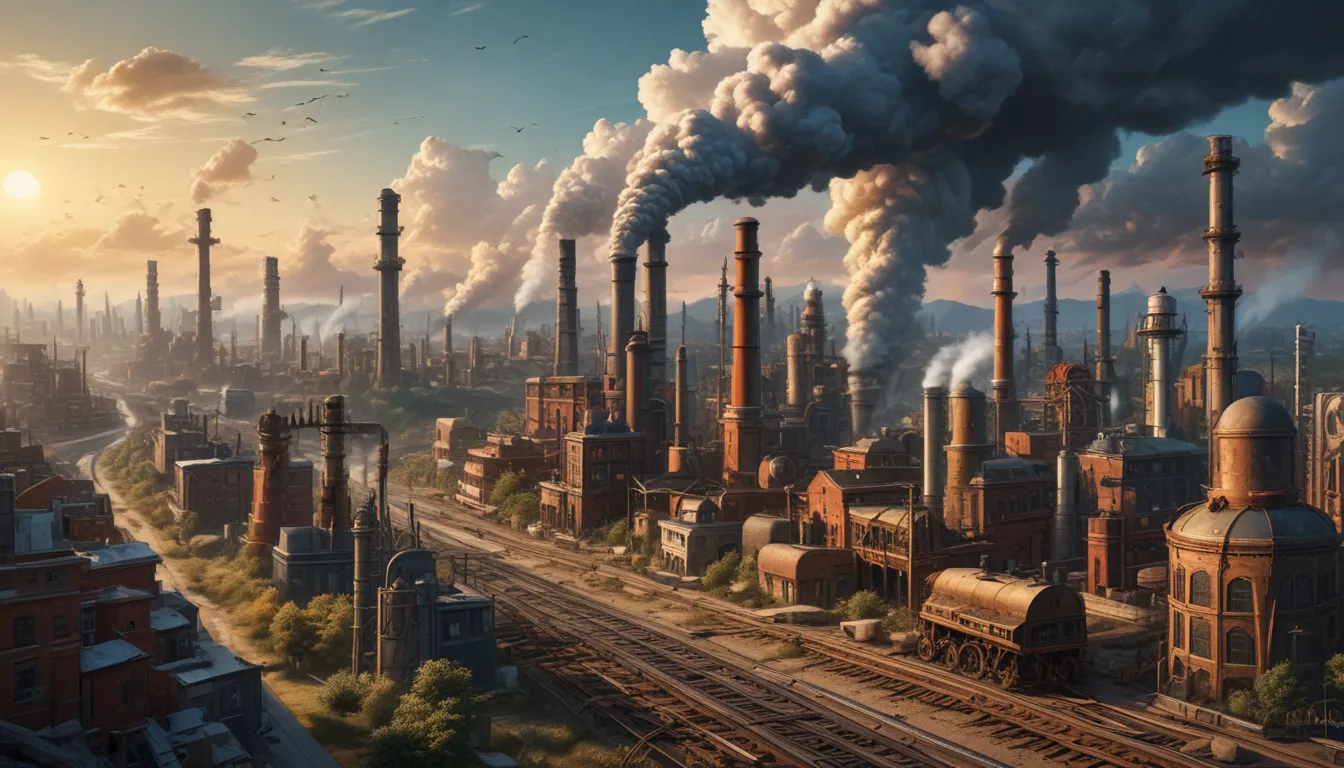A Note About Images: The images used in our articles are for illustration purposes only and may not exactly match the content. They are meant to engage readers, but the text should be relied upon for accurate information.
Industrialization stands as a pivotal moment in human history, marking a significant shift from agrarian economies to industrial ones. This transformative period brought about unprecedented advancements in technology, infrastructure, and global trade, shaping the modern world as we know it. In this article, we will take a deep dive into the fascinating facts surrounding industrialization, exploring its key takeaways, historical origins, and lasting impact on society and the environment.
Exploring the Key Takeaways of Industrialization
- Industrialization heralded a shift from manual labor to machine-driven production, fostering urbanization, technological progress, and social and environmental challenges.
- The Industrial Revolution served as the catalyst for industrialization, revolutionizing transportation, communication, and global trade while also giving rise to social and economic disparities and environmental issues.
Unveiling the Origins of Industrialization: The Industrial Revolution
The Industrial Revolution, which commenced in 18th-century Great Britain, laid the groundwork for widespread industrialization worldwide. By transitioning from manual labor to mechanized production, this period sparked transformative changes in economies and societies, propelling humanity into a new era of progress.
The Urbanization Phenomenon: A Product of Industrialization
The advent of industrialization led to significant urbanization as people flocked from rural areas to burgeoning industrial cities in pursuit of employment opportunities. This rapid urban growth brought about a host of advantages and challenges, shaping the landscape of modern urban living.
Revolutionizing Transportation: The Legacy of Industrialization
Industrialization revolutionized transportation with the development of steam-powered locomotives and railways during the Industrial Revolution. This breakthrough facilitated the movement of goods and people, fostering connectivity across regions and spurring economic growth.
The Textile Industry: A Pioneer of Industrialization
The textile industry emerged as a pioneer of industrialization, embracing innovations such as the spinning jenny and power loom to streamline production processes. These advancements made textile manufacturing faster, more cost-effective, and efficient, paving the way for further industrial progress.
The Harsh Realities of Factory Working Conditions
Despite the economic strides brought about by industrialization, factory working conditions were often perilous and harsh. Workers endured long hours, meager wages, and unsafe environments, fueling the rise of labor movements and trade unions advocating for improved working conditions.
Fostering Technological Advancements: The Legacy of Industrialization
The pursuit of efficiency and productivity during the industrialization era drove remarkable technological advancements. Innovations like the steam engine, telegraph, and electric power transformed industries, setting the stage for continued innovation and progress.
Confronting Environmental Challenges: The Dark Side of Industrialization
The rapid expansion of industries and reliance on fossil fuels during industrialization yielded significant environmental consequences. Pollution, deforestation, and resource depletion emerged as pressing concerns, underscoring the need for sustainable industrial practices.
Addressing Social and Economic Inequalities
Industrialization gave rise to stark social and economic disparities as wealth distribution became uneven. The emergence of industrial capitalists alongside a working class marked by low wages exacerbated social tensions, prompting calls for reform and greater equity.
Accelerating Global Trade and Colonization
The industrial revolutionized era propelled global trade and colonization as industries sought raw materials and new markets. European powers, in particular, leveraged industrialization to establish colonies, shaping the geopolitical landscape and influencing historical trajectories.
The Communication Revolution: Legacy of Industrialization
The invention of the telegraph and advancements in printing technology revolutionized communication during industrialization, enabling the rapid dissemination of news and information on a global scale, fostering unprecedented connectivity.
The Enduring Legacy of Industrialization
The enduring impact of industrialization resonates in modern society, shaping technological advancements and economic systems that define our world today. While industrialization brought about remarkable progress, it also presented critical social and environmental challenges that continue to shape our collective future.
In conclusion, industrialization stands as a defining chapter in human history, embodying a period of profound change with far-reaching implications for society and the environment. As we navigate the complexities of a rapidly evolving world, understanding the historical significance of industrialization and its impact on our world is paramount. Let us strive to harness the power of industrialization responsibly, balancing its benefits with sustainable practices that promote the well-being of humanity and our planet.
FAQs: Delving Deeper into Industrialization
-
What is industrialization? Industrialization refers to the process of transitioning an economy from agriculture-centric to manufacturing-centric, emphasizing advanced technologies, increased productivity, and urban growth.
-
When did industrialization begin? The Industrial Revolution, marking the onset of widespread industrialization, unfolded in the late 18th and early 19th centuries, primarily in Britain, before spreading globally.
-
What drove industrialization? Technological advancements, resource availability, international trade, and favorable economic and political conditions were key drivers behind industrialization’s rapid growth and expansion.
-
How did industrialization impact society? Industrialization brought about significant social changes including urbanization, employment opportunities, middle-class emergence, but also poor working conditions and social disparities.
-
What were the environmental consequences of industrialization? Industrialization led to environmental degradation through pollution, deforestation, and resource depletion, underscoring the need for sustainable industrial practices.
-
Has industrialization benefited all countries equally? Industrialization has not benefited all countries equally, with some leveraging its potential for economic growth while others facing challenges due to limited resources or political instability.
-
How can industrialization be made sustainable? Industrialization can be made sustainable through the adoption of eco-friendly technologies, waste management practices, and fair labor standards, ensuring a harmonious balance between growth and environmental preservation.
As we reflect on the intricate tapestry of industrialization’s impact on our world, let us embrace a future guided by sustainable practices and equitable growth, mindful of the lessons learned from this transformative era.






